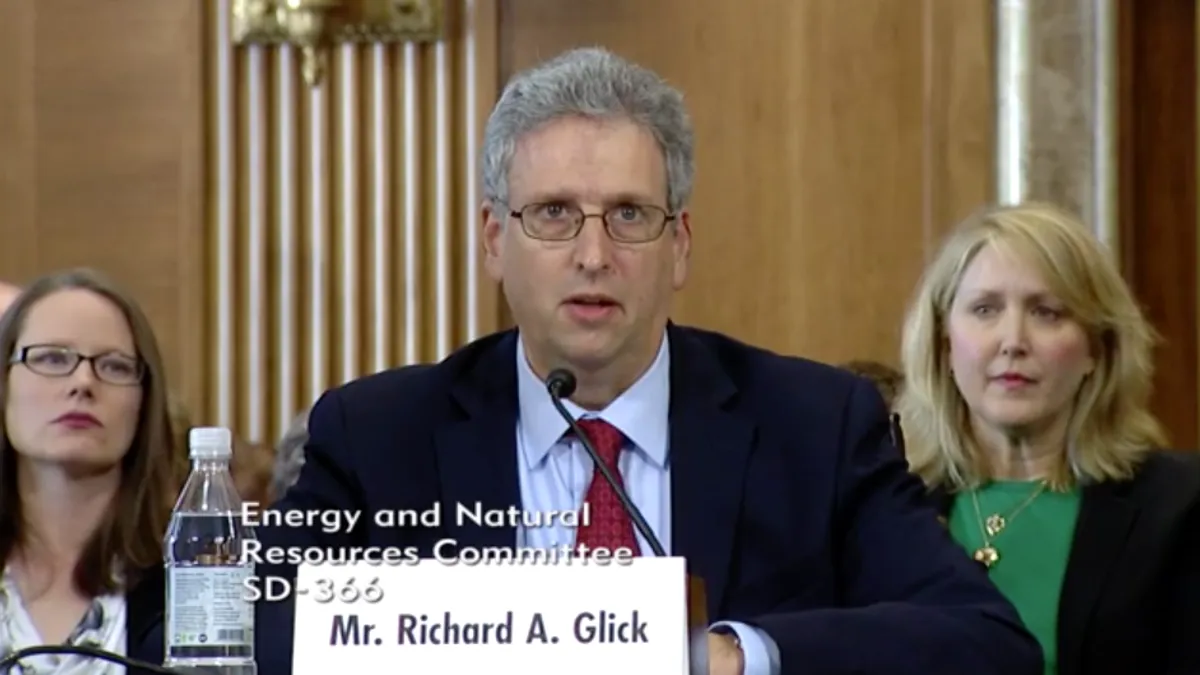Dive Brief:
- The Trump Administration's ethics pledge has been incorrectly applied at the Federal Energy Regulatory Commission (FERC), and could leave the agency without a quorum by leading Commissioner Richard Glick to recuse on important regulatory dockets, according to email statements released Thursday.
- Glick signed the pledge when he joined the commission, promising to avoid cases involving his former employer Iberdrola USA (now Avangrid), under the impression that the limitation ended in February 2018. In September, the Designated Agency Ethics Official (DAEO) corrected previous counseling to say the recusal is effective two years after beginning work as a federal employee, not two years after his last date of employment at Avangrid.
- Glick is now working with his staff to identify proceedings since 2018 where he cast a vote with Avangrid as a participant. "I am obviously frustrated by this," he told Utility Dive. According to DAEO, Glick must recuse himself from Avangrid matters until Nov. 29, 2019.
Dive Insight:
The chance of FERC being unable to take action due to recusals increases when there are fewer commissioners. Even as a four-member commission, a lack of quorum kept FERC from acting on ISO-New England's proposed short term reforms, as Commissioner Bernard McNamee and former Commissioner Cheryl LaFleur recused themselves.
Glick said he "ceased work on all matters related to proceedings to which Avangrid (and its subsidiaries and affiliates) is a party" as of Sept. 10.
A lack of quorum could interfere with FERC work in a number of key cases, including the dockets on resilience and on the PJM capacity market.
"I don't think the number of recusals is so great and the number of instances where there's no quorum is so great, but [...] some of them like this PJM capacity market are extremely important," Rob Gramlich, former FERC staffer and founder of consulting firm Grid Strategies, told Utility Dive.
Gramlich recently co-authored a study assigning a $5.7 billion potenial annual cost to a stringent FERC interpretation of the PJM capacity market proposal.
Glick and his staff could not comment on matters relating to pending FERC dockets.
Recusals are increasingly important within FERC when the commission has three members, as it does now, since three of five commissionser are needed to establish quorum. FERC was down to a three-member commission in 2016 before losing quorum entirely in 2017.
President Donald Trump is expected to tap FERC General Counsel James Danly for one of the two open positions, according to Politico.
Commissioners tend to err on the side of caution when it comes to recusals, according to former commissioners.
"I did have to recuse myself if a party to a case was a former client or if there was some potential conflict or past financial interest. Glick's recusals could impact any case depending on the parties," former chairman Jon Wellinghoff, currently at Grid Policy, told Utility Dive.
However, the Trump administration established its own ethics waiver, for all executive branch appointees.
"It is noteworthy that at all times, the Commissioner [Glick] has been in full compliance with all statutory and regulatory ethics requirements," Charles Beamon, associate general counsel for the DAEO, wrote in a memo.
Glick will either recuse himself until the end of the ethics pledge recusal period or seek an ethics pledge waiver, "which may be necessary for the preservation of a quorum," he said in his statement.
DAEO granted an ethics waiver on August 29 to McNamee. "After careful consideration, I find that it is appropriate and in the public interest to grant this Limited Waiver to ensure Commissioner McNamee's participation in significant issues pending before the Commission. His duties cannot be adjusted and his role cannot be performed by another Commission employee," Scott Gast, senior White House ethics counsel, wrote in the limited waiver certification.
"This request was not made primarily to address potential quorum issues," a FERC staffer told Utility Dive. McNamee was already working for the Trump administration and had signed his ethics pledge before coming to FERC. He requested a limited waiver on July 24 because "it was believed that the two year cooling off period" between his government work and providing legal services to clients at McGuire Woods had ended.
CORRECTION: A previous version of this article misidentified the author of the memo on Commissioner Bernard McNamee's limited waiver certification. Scott Gast, senior counsel to the president, wrote the memo.














